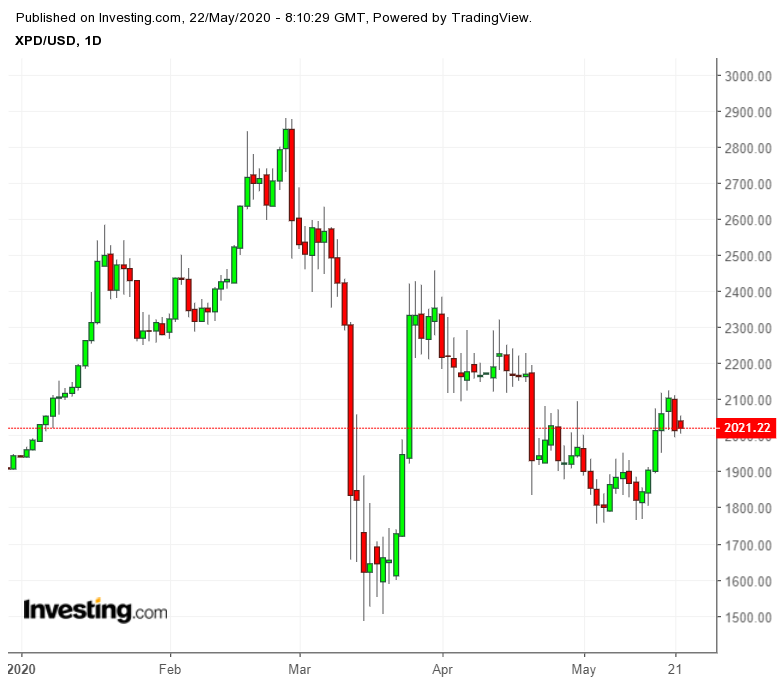In case, you’re wondering: Palladium is still alive, and it’s next wave, like the COVID-19, is coming—though in a good way.
Having beat gold prices last year, palladium has stayed at a premium to be crowned by the media as the costliest-traded metal—actually that honor goes to rhodium, a precious metal that’s so scarce that it’s just as well that palladium wears the crown.
The spot price of palladium scaled a record high of $2,881.33 an ounce on Feb. 23, just before the coronavirus pandemic began crippling the world economy.

Until then, explosive growth in the world automotive sector, led by China, had fueled highs almost every day in palladium, a silvery-white metal critically short in supply but also critically important as a component to catalytic converters and emissions purifiers of gasoline engines.
Since that February high, however, palladium has been locked in an $800 trading range between $1,600 and $2,400. But its gap versus gold hasn’t narrowed much, with the spot price at $2,005 and futures at $2,040 on Friday against spot gold’s $1,735 and gold futures’ $1,737.
Relatively, platinum and rhodium—which act as catalytic converters and emissions purifiers in diesel engines—haven’t lost much ground either.
Late Year Palladium Rally Seen From Supply Squeeze
London-based precious metals consultancy Metals Focus said regardless of the impact of COVID-19, it expected supply of palladium to stay in a deficit and platinum in a surplus, through the year.
“Later this year, we expect palladium prices to rally in spite of the current COVID-19 related challenges,” the consultancy said.
It added:
“As physical demand improves, we think the price is likely to return to the mid-$2,000s in the second half of 2020 and we would not be surprised if the February peak were approached before year-end.”
Since 2010, above-ground stocks of palladium have declined by 5.3 million ounces (165 tons), or about 30%, analysts said.
It would be the smallest such deficit since the palladium market was last in surplus in 2011, according to Metals Focus data. The deficit was as much as 1.29 million ounces in 2016.
For 2020, the consultancy sees palladium demand declining to 9.68 million ounces from 10.88 million the year before. The bulk of the demand is for auto catalysts, and this is expected to decline to 7.89 million ounces from an all-time high of 8.88 million in 2019. Supply is seen falling to 9.55 million ounces this year from 10.29 million.
Despite the disruption to the global auto market from COVID-19 and the sharp slide in its prices, spot palladium remains up for 2020, with a near 4% gain on the year versus a previous 47% at the height of February’s rally.
‘Strong Buy’ Call On Palladium
Underscoring the forecast by Metals Focus, Investing.com’s Daily Technical Outlook labels spot palladium a “Strong Buy,” projecting an immediate top-end resistance of $2,201.74 for the white metal versus Friday’s trade hovering at $2,005.
Specialty metals refiner Johnson Matthey (LON:JMAT) concurs with the outlook by Metals Focus. The world’s largest secondary refiner of Platinum Group Metals, which include palladium, platinum and rhodium, says South African supplies of PGM were forecast to fall by at least 20%, while the collection of secondary materials will also be severely disrupted.
That aside, palladium’s demand will be location-specific as coronavirus impacts different places at different times in different ways, Rupen Raithatha, Johnson Matthey’s director of market research, told Reuters in a recent interview.
Said Raithatha:
“The cold market balance, whatever it may be in the end, may not be the biggest determinant of price direction and volatility when you have large parts of the market offline and the potential mismatch between supply and demand coming back.”
